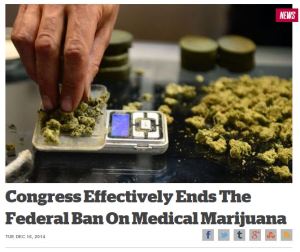A Public Service for Our Readers Regarding Federal Drug Enforcement
We are posting this as a public service and informational notice, for our cannabis using, interested, curious, or just plain liberty oriented readers and friends…
Contrary to articles such as this:
Congress Effectively Ends The Federal Ban On Medical Marijuana
It seems the controversial $1.1T spending bill that is preventing the U.S. government from shutting down is chock full of surprises.
As you may know, much to the dismay of marijuana activists and lovers of democracy everywhere, the bill smacked down Washington DCs referendum that legalized recreational marijuana in the nation’s capital. What you may have missed (because those shifty politicians are doing everything under the table) is that the bill also quietly, but effectively lifted the federal ban on medical marijuana.
Let us be VERY clear… NO the federal government has not legalized, or ended the federal prohibition of medical marijuana.
No, really, they didn’t, no matter what High Times says.
Manufacture, distribution, transportation, storage, sale, possession, and use, of Marijuana are all still federal crimes. Further, they are automatic disqualification on a background check, or a drug test, or a security clearance etc… etc…
They also make one a prohibited person with respect to firearms, explosives, and destructive devices.
Yes… even in Washington and Colorado.
All they did in this omnibus appropriations bill, was to partially defund and deprioritize enforcement of federal marijuana prohibition, against medical marijuana dispensaries only (NOT grow ops, or users) in those states with medical marijuana, between January and September.
That’s it.
Here is the actual text, of the portion of the bill in question:
“Sec. 538. None of the funds made available in this Act to the Department of Justice may be used, with respect to the States of Alabama, Alaska, Arizona, California, Colorado, Connecticut, Delaware, District of Columbia, Florida, Hawaii, Illinois, Iowa, Kentucky, Maine, Maryland, Massachusetts, Michigan, Minnesota, Mississippi, Missouri, Montana, Nevada, New Hampshire, New Jersey, New Mexico, Oregon, Rhode Island, South Carolina, Tennessee, Utah, Vermont, Washington, and Wisconsin, to prevent such States from implementing their own State laws that authorize the use, distribution, possession, or cultivation of medical marijuana. Sec. 539. None of the funds made available by this Act may be used in contravention of section 7606 (“Legitimacy of Industrial Hemp Research”) of the Agricultural Act of 2014 (Public Law 113-79) by the Department of Justice or the Drug Enforcement Administration.”
There has been no real change in the law, there is just a change in the administration of a small subset of enforcement.
In fact, this action makes getting the changes we need in the law harder and less likely.
Far worse though, it furthers the toxic notion that we can just arbitrarily, capriciously, and disparately, choose to not enforce the law, when we feel like it… But then any time we change our mind we can go ahead and start enforcing it again.
This disrespects and debases the very foundation of rule of law.

